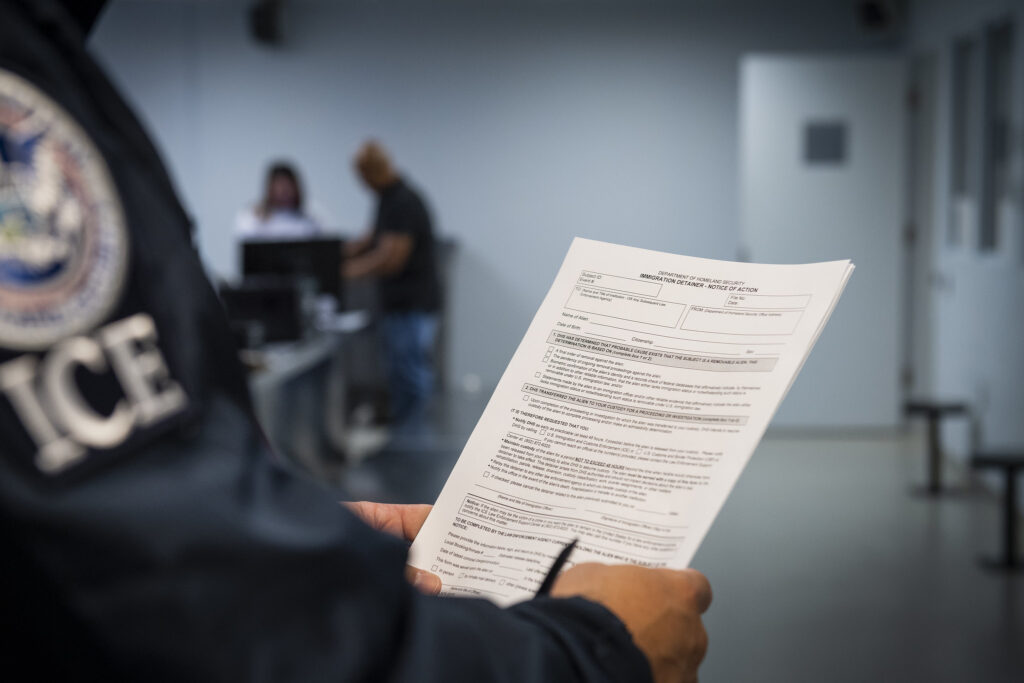A U.S. Immigration and Customs Enforcement agent holds an immigration detainer form in a detention facility. (Photo from U.S. Immigration and Customs Enforcement)
In an attempt to help the Trump administration accomplish its immigration goals, the Utah Legislature passed a bill on Thursday that repeals a 2019 law shielding migrants from being deported if they commit a misdemeanor offense.
But as Immigration and Customs Enforcement, or ICE, ramp up deportations, critics worry the bill will disproportionately impact immigrants with lawful status, like visa holders or refugees, while doing nothing to actually facilitate the removal of people in the country without authorization.
Sponsored by Rep. Candice Pierucci, R-Herriman, HB226 increases the maximum sentence for class A misdemeanors from 364 days, to 365. Per federal law, if an immigrant spends one year in jail or prison, it automatically initiates deportation proceedings.
The 2019 law lowered the maximum sentence by one day, which the bill’s sponsor, former Rep. Eric Hutchings, at the time said was an attempt to reduce deportations.
“People with misdemeanors are getting caught up in that net, and there are automatic deportation proceedings as a result,” said Hutchings, R-Kearns, in 2019. The law passed unanimously.
SUBSCRIBE: GET THE MORNING HEADLINES DELIVERED TO YOUR INBOX
But with the Trump administration vowing to carry out mass deportations, lawmakers have reversed course. Although it’s an incremental change, the one-day increase in sentencing would make it easier to deport migrants who commit crimes, regardless of their legal status.
“In 2019, we asked ICE agents why has Utah been such a magnet for illegal immigration,” said the Senate sponsor, Dan McCay, a Riverton Republican. “Their response was, this change in policy.”
The 365-day sentence in this year’s bill only applies to crimes against a person — that mostly includes violent offenses, like assault, stalking, sex crimes, child abuse or violation of a protective order. Driving under the influence was also included in the list of crimes.
The bill passed out of the Senate Thursday morning after a 21-8 vote, with Sens. Daniel Thatcher, R-West Valley, and Todd Weiler, R-Woods Cross, joining Democrats in opposition. It’s now headed to the governor’s desk.
The vote came after a contentious debate. Thatcher said it “might be the worst bill I’ve seen this year.”
Senate Minority Leader Luz Escamilla, D-Salt Lake City, who accused McCay of “grandstanding,” said the bill robs people of due process. McCay said that idea was “foolish.”
Both Thatcher and Escamilla worry the bill will disproportionately target legal immigrants, since people without lawful status are already being deported. ICE doesn’t need a migrant in the country illegally to serve a one-year sentence to deport them — they can deport them for the lack of documentation alone.
“Right now, ICE is placing detainers on anyone with allegations. Anyone who’s undocumented. So if they are arrested and they get put in jail and it’s just an allegation, that starts deportation proceedings, and it doesn’t matter if they’re convicted or not,” said Adam Crayk, a Salt Lake City-based immigration attorney. “You don’t even need to break the law and you’re deportable.”
Crayk called it a messaging bill. It shows the state is behind the Trump administration, but doesn’t actually help federal immigration officials in their goal to deport people here unlawfully, he said.
“It does not really do much, but target those that are potentially already here legally,” he said.
Need to get in touch?
Have a news tip?
Lawmakers acknowledge that HB226 could impact all immigrants. Speaking on the Senate floor Thursday, Calvin Musselman, R-West Haven, told his colleagues “it does affect those who are legally here working.”
But pointing to the list of crimes outlined in the bill, which include sex crimes, violent offenses and more, he said: “These individuals who are causing these circumstances, maybe it is best that they be deported. These are very serious crimes.”
Escamilla offered a counterargument. An immigrant with a protective order might run into their ex-spouse at a grocery store on accident, receive a stalking conviction, spend one year in jail under the new sentencing guidelines, and automatically face deportation upon release. Instead of being able to plead their case to an immigration judge, which they would be able to do had they spent 364 days in jail, the one-year sentence removes the discretion of the courts.
“You’re not even going through due process in the immigration court,” she said.
In addition to the enhanced penalty, the bill also seeks to facilitate deportations in several other ways. It would:
-
Direct local law enforcement to hand over immigrants to ICE after they serve one year in jail or prison, so their deportation proceedings can begin.
-
Require judges to consider immigrants a flight risk during criminal proceedings.
-
Require jail employees to provide courts and federal immigration authorities with an individual’s immigration status.
The latter point also gave Crayk, and other immigration attorneys, some heartburn. Immigration law is complex, he said, and he worried that jail employees or other law enforcement officials might misrepresent a person’s status.
“They have to figure out that they’re unlawful, who’s going to do that?” Crayk said. “You’re dealing with the most vulnerable population, then you have jail employees trying to figure out what their status is, then coordinate with ICE?”
SUPPORT: YOU MAKE OUR WORK POSSIBLE
Read the full article here


